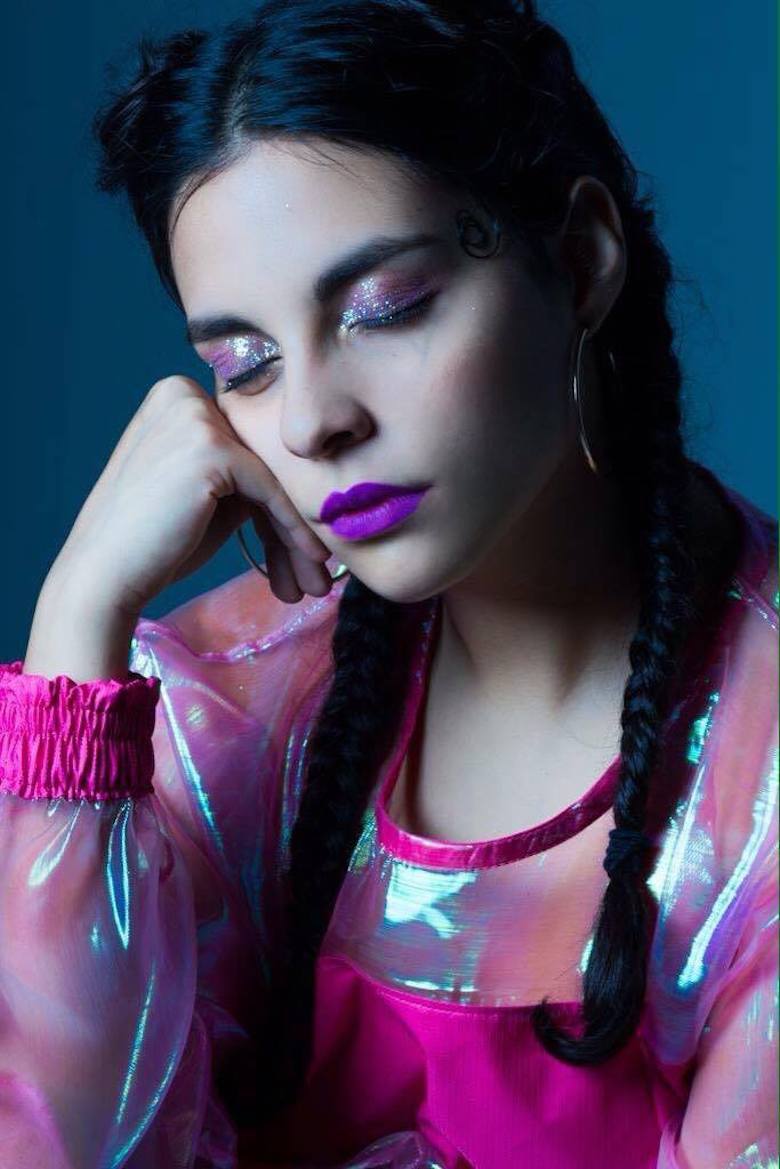When Mexican R&B artist Mariana “Nan” de Miguel visualizes her musical persona, Girl Ultra, she says she sees “a character that lives inside me—a super heroine that never existed in the real world.”
“Girl Ultra is this extroverted, hidden part of my personality that comes out ritualistically before I perform,” she explains. “I have the urge to pull out my truest self, to shout, to step on stage and transform.”
An astrology aficionado, de Miguel draws from the stars to make sense of both her Girl Ultra persona and her real-world identity. She describes herself—and other Scorpios like her—as “resourceful, perceptive, passionate, determined, and emotionally intense.”
De Miguel claims it’s that drive and emotional intensity that have propelled her career so far so fast: It’s what allowed her to go from singing in a disco band in high school and earning extra cash from DJ gigs, to signing as a solo act with Finesse Records by the time she was ready to graduate. Further, she says, it’s these same Scorpio-esque qualities that fueled her decision to forego college and instead pursue music full-time in Mexico City.

At 22, de Miguel has already released two EPs, Boys and Adiós, and plans to drop a full-length album under Finesse Records later this year. Operating out of Mexico City, she is one of the few artists producing contemporary R&B south of the U.S. border, with The Fader going so far as to credit her with “breathing new life into Mexico’s R&B scene.” At the same time, she’s one of a select group of Spanish-speaking artists whose music is breaking into mainstream R&B’s predominantly anglophone audience, as demonstrated by her upcoming North American tour and her featured tracks with other major crossover Mexican artists, such as Ximena Sariñana and CLUBZ. Critics have described her sound as “suave” and “sexy,” and others have said that her music has the ability to resurrect your heart.
Still, none of these accomplishments are enough for the R&B singer.
“It feels good to be on sight and be called a breakthrough in the Mexican R&B scene,” she says. “I’m proud of that because I work my ass off. But my and my label’s bigger purpose is to elevate the standards, to push other artists to create so we can develop a scene. If we work together, we can develop an independent industry inside our country.”

De Miguel hopes that her music will help revitalize Mexico’s entire music scene. In previous interviews, she’s mourned that “there was no R&B in Mexico,” saying that Mexico has “never had a TLC, a Beyoncé—no one had done it all the way.”
Now, she’s eager for Mexican R&B’s moment in the global spotlight. More than personal recognition, de Miguel wants a revolution.
“My greater purpose is to develop this [R&B] genre that’s relatively new to Hispanic industry through the [Spanish] language,” she says. “Mostly, I do not engage in political topics, but I’m still out there fighting for Latina women by speaking through my work.”
Under her Girl Ultra alias, de Miguel produces luxurious, fluid R&B tracks and prefers to stick to the genre’s usual subjects of romance and lust. “Lejos,” one of her most popular songs, is about trying to achieve a “healthy and conscious goodbye” at the end of a relationship. In an interview with Vice, she cites her hyperactive hormonas (hormones) as the primary influence behind her heavily sensual image and music.
Nevertheless, she argues that bringing Spanish to the forefront of modern R&B is its own form of cultural activism.
“When I play in the States, I see Latinas and other girls singing along with me on a show,” de Miguel says. “And sometimes after, they approach me and thank me for letting them listen to the kind of music they grew up with, in their own language. It’s a blessing to create that big connection even if we don’t know each other personally. It’s our roots giving each other a very warm hug.”
De Miguel looks forward to the day when Latina women can be seen as “just being an artist, another human,” rather than being recognized primarily for their minority status.
She makes clear, though, that she considers her Latina identity a “blessing.”

“I am Mexican—I’ve got that tattooed on my skin and on everything I do,” de Miguel says. “My family always taught me to represent and respect my roots through their culture, their music, their food. I’ve always been proud of who I am, where I come from.”
In general, de Miguel says she’s optimistic about the future of diversity and multicultural acceptance in the Americas. Identifying herself as part of a progressive youth movement that’s gaining power every day, de Miguel says, “We’re more awake than ever. We’re culturally breaking barriers and we are becoming one through connectivity. We’re a very opinionated generation; I just feel like we need to find how to do it the right way.”
For de Miguel, the changes she dreams of—in her music career, in Mexico, in the culture of her generation—are all just around the corner, awaiting her outstretched hand.
“Sometimes your motherland’s opportunities limit your potential,” she says. “But I’ve always seen Girl Ultra as borderless, limitless. I just keep focused, and work hard every day.”

Pacific Standard’s Ideas section is your destination for idea-driven features, voracious culture coverage, sharp opinion, and enlightening conversation. Help us shape our ongoing coverage by responding to a short reader survey.





